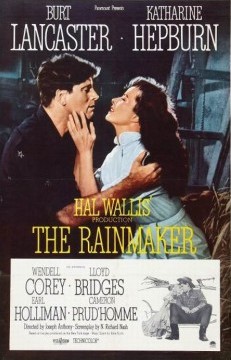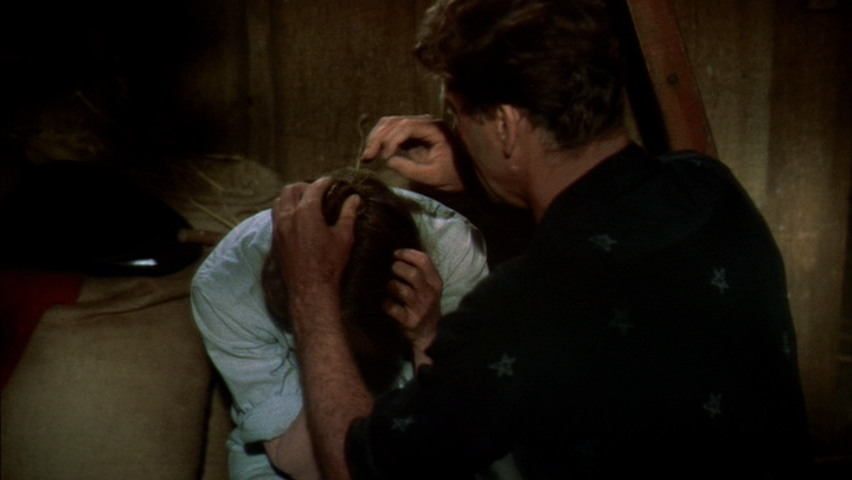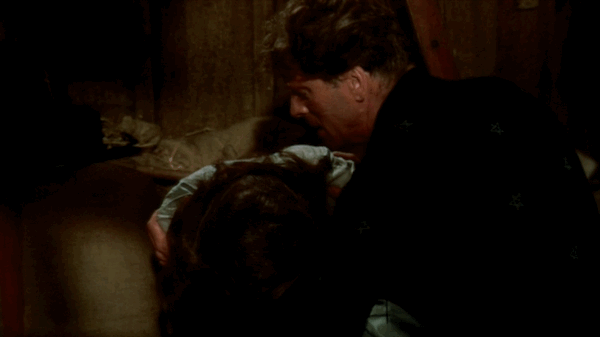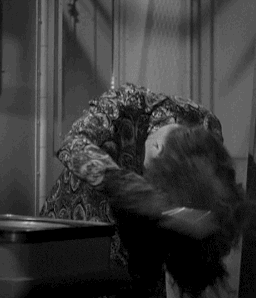A Year with Kate: The Rainmaker (1956)
 Wednesday, July 30, 2014 at 3:03PM
Wednesday, July 30, 2014 at 3:03PM Episode 31 of 52: In which Katharine Hepburn lets her hair down and rolls in the hay with Burt Lancaster.
 It makes a certain kind of sense that The Rainmaker, which is the last of Kate’s Spinster Films, should be the most archetypal of this phase of her career. N. Richard Nash’s screenplay about a silver-tongued conman (Burt Lancaster) who promises water to a town and love to an old maid (Kate) works almost as a genre checklist: Lonely Single Woman? Check. Scenes establishing that most folks find her plain? Check. Handsome outsider who sees the beauty in her? Check. Life affirming rendezvous? Check. Throw in a metaphor about the drought-stricken land and Lizzie’s lovelorn heart, and you have The Rainmaker.
It makes a certain kind of sense that The Rainmaker, which is the last of Kate’s Spinster Films, should be the most archetypal of this phase of her career. N. Richard Nash’s screenplay about a silver-tongued conman (Burt Lancaster) who promises water to a town and love to an old maid (Kate) works almost as a genre checklist: Lonely Single Woman? Check. Scenes establishing that most folks find her plain? Check. Handsome outsider who sees the beauty in her? Check. Life affirming rendezvous? Check. Throw in a metaphor about the drought-stricken land and Lizzie’s lovelorn heart, and you have The Rainmaker.
Make no mistake, Lancaster and Hepburn elevate The Rainmaker. Their acting styles clash--Kate’s Old Hollywood manner butts against Lancaster’s charismatic, physical style (which he’d later hone for the incredible Elmer Gantry). Apparently, the two actors disagreed on the set as well. As a result, though both are compelling, they’re never connected in their scenes together. This works in the film’s favor. It’s completely believable that Starbuck and Lizzie are two people who can love each other for a night, but don’t like each other enough to truly fall in love for good. Their dreams are too different; they don't see each other for who they really are.
The best thing about having a film as unsubtle as The Rainmaker is that it relies heavily on its stars, both in acting talent and in star image. Much of this series has been devoted to identifying, attempting to dissect, and--as often as not--flat out worshipping Katharine Hepburn’s star qualities. We’ve touched on everything from Kate’s beauty to her tomboyishness to her charisma and comedic chops, but we’ve neglected one physical trait which was as defining to later Kate as her famous cheekbones: her hair. More specifically, this is about Katharine Hepburn’s hairography, in the key scenes where she unwound the topknot and let it all hang loose.
My official Katharine Hepburn Hair Theory after the jump

Kate’s rather severe bun makes early appearances in movies like Song of Love and Without Love, but it isn’t until The African Queen that the tight topknot established itself as a permanent fixture of Kate’s onscreen style. In The African Queen, the more clothes (and hairpins) Rosie loses, the more human she becomes, until she fully transforms from uptight minister’s sister to the kind of heroine who can argue with Nazis and smile at her own wedding/hanging. Later, in Summertime, the thematic link between Kate’s hairdo and her heart is more definitely (and romantically) established, since Jane Hudson only lets her hair down once, to swap sunset kisses with her lover de Rossi.
The Rainmaker more obviously uses Kate’s hair for effect. The turning point of the film--and Lizzie's self image--is the love scene in the barn. In an effort to convince the heartbroken Lizzie that she is beautiful, Starbuck unpins her hair. As it cascades down, she hides behind it, even as Starbuck cajoles her to say “I’m pretty.” Lizzie cries and hides and refuses, until she suddenly gains brief courage, and yells it out.

Close your eyes. Close them. Now say, "I'm pretty." Say it, Lizzie! Say it!

The scene progresses from there as you’d expect.
It’s cheesy as a 90s romcom, but Lancaster and Hepburn save the scene from falling into cliche. Kate shows such shocking transformation and vulnerability in the moment, and when she claims herself she lights up in a way that's been dampened since the beginning of the film. This is the signifier Kate’s hair will become in the future. It’s not about heroism or sex, it’s about the vulnerability of letting go of control ever so briefly. For Lizzie, it’s letting go of what she knows and trusting what Starbuck believes. For later characters, it will be a descent into madness or a contemplative moment of grieving.
When Katharine Hepburn took her hair down from its iconic bun, she turned it into a prop and a thematic device. It could be a shield, a pillow, a curtain, a frame, something to be gathered or pulled or mangled or smoothed depending on her character’s emotion. In our upcoming movies, watch for the scenes where Kate lets her hair down. They’re some of the most powerful she put to film.
Can you think of another actor or actress who did the same? I’m pulling my own hair out trying to think of one. Post in the comments below!

 Previous Week: The Iron Petticoat (1956) - In which you’d think Katharine Hepburn would have learned to stay away from accents by now.
Previous Week: The Iron Petticoat (1956) - In which you’d think Katharine Hepburn would have learned to stay away from accents by now.
Next Week: Desk Set (1957) - In which Katharine Hepburn plays a woman named Bunny who starts a battle of wits with Spencer Tracy's computer. That's actually the plot.
Tuesday 8/12: Hit Me With Your Best Shot crossover -Suddenly, Last Summer
* This is actually a gif from Without Love, but I saved it until now. I think it fits better here.



Reader Comments (16)
Without the powerful personalities of the two leads, especially Lancaster, this would teeter perilously close to being a B movie. Despite attempts to open it up it's unmistakably a filmed play and the story's seeming delight in making Lizzie an object of derision is off putting. I realize it's meant to set up the deliverance she'll ultimately receive through Starbuck's attention but it makes the film until his arrival heavy going. It's a lot of flash over substance once he does show up but compared to that mess we looked at last week it's a pretty good film.
The change of hairstyle is a commonly used signal to audiences of a change in the character's outlook but I can't think of another actress who used the hair coming down to signal a release of passion or some other emotion as frequently as Kate.
Yes, finally the hair post. :-) I've been intrigued and naggy about it from the beginning of this series. Maybe it's just because we never got to see Kate's (allegedly) beautiful red hair in a color movie. By her first color movie, it was up and kind of mousy brown/grayish.
But even in black and white, it looks pretty spectacular. Thick and naturally wavy and bouncy. That sort of hair would normally get the Lauren Bacall/Veronica Lake treatment but that never happened with Kate. Her hair is more or less "short" in every single movie. The closest she got to long hair onscreen really was around The Philadelphia Story and Woman of the Year, and even then it's not really glamorous, just fashionable.
Yet it is so interesting to me that when she put her hair up, seemingly forever, she kept it long. That can't be the easiest way to have "short" hair, and the idea of putting your long hair up on your head is so old fashioned. Something Kate's mother might have done. Did Kate wear it down at home? Did Spencer insist she keep her long hair, and she wore it up "professionally?" It's a mystery to me, does anyone know?
As for The Rainmaker, I'm glad it exists I guess. I prefer Summertime because even though it's so similar in theme, at least the scenery is better (Burt excluded from that judgement of course, talk about beautiful). I guess the big difference is this is Jane Hudson on her own turf. If she had never gone to Venice. She got pretty lucky that Burt came along of course, but what if he never had? Too sad to even contemplate, not that she needed a man, but she needed a push and some confidence.
PS did anyone besides me see Audra in the musical version of the Rainmaker called 110 In The Shade that played in New York a few seasons ago?
Desk Set: Because technophobia never dies.
Dave -- I have the soundtrack to 110 In The Shade, but I haven't seen the show. I just liked the song "Raunchy."
As for the up-vs-down question, judging from the way she talks about it to the hairdresser at the Dick Cavett Show ("Do your best, I can never do anything with it") I get the impression that she kept it up most of the time for practicality's sake. (I did that too when I had long hair.)
I have frankly no idea what color her hair actually was. If you click through old posts and look at the poster art, her hair could be anything from mousy brown to cartoonish red. No help there. Her color movies are printed in Technicolor, which didn't capture subtle shades well, and she wasn't photographed in color until her hair had already started greying. My guess would be dark auburn.
I've thought a lot about this.
Dave,
I did not see it on stage but I have seen most of Audra's performance in 110. The musical had the added bonus of John Cullum, most recently visiting this site in the tribute to Barbara Harris in the clip from On a Clear Day
Audra, with her spectacular voice, overwhelmes the part a little; Kate's Lizzie is quieter and more believable to me. The pairing of that Burt Lanacster smile and Hepburn sometimes makes you overlook a wonderful ensemble and supporting cast. They are so part of Lizzie's world that you do understand why she turns Starbuck down.
I'm 100% for this trope of letting your hair down meaning sexual liberation and the end of buttoned up repression. it's such a handy trope plus it's visually exciting EVERY time ;)
The gifs in this post look like something out of a shampoo ad.
Anne Marie, I've never even seen a color still photo of Kate from the 1930s. But most accounts seem to say that her hair was red, so I'll assume that's true. By the 50s it was pretty much brown. My Dad had rather vivid red hair in his teens and 20s, but by his 30s it was brown and grey. Maybe Kate was the same? And she mostly seemed to use her own god given hair color unless it was for a role as far as I can tell. THAT is absolutely daring in Hollywood for sure. Even a lot of men (most?) didn't get away with that.
PS Audra is too vivid on stage to be "plain" really, so you just had to assume she wasn't "popular" and leave it at that. Her leading man was Steve Kazee and he really made an impression, because Audra was already at Kate-level glory as far as the stage is concerned, but Steve Kazee was almost unknown.
Dave-Barbara Stanwyck was the same as far as sticking with her natural (also auburn) hair color unless a wig was called for. The only time she allowed it to be changed was for Stella Dallas because she felt a wig wouldn't enable her to get as close to the character as she wanted to. From that point on though she steadfastly stay with her own shade. When her hair started to grey she flatly refused to dye it saying "How silly everyone gets older." But aside from her Kate is probably the only other exception.
This is one of those films that is a little like sitting down to a great piece of steak and a side order of turnip. And I hate turnip, but watching Lancaster and Hepburn together is worthwhile even if they have different styles. I find the barn scene rivetting, you can see the 2 stars playing with the melodrama, reaching higher and higher. I find most of this film quite awful, but there are some memorable moments.
As for the hair, It became a perfect icon, that uptight bun fit her persona.
Anne Marie, would you consider Audrey Hepburn as a possible example of concious style?
The upright bun in "Breakfast at Tiffany's" indicates elegance. Same as in "My Fair Lady", and "Roman Holiday" To signal a more free spirit, we get the gamine short cut, or ponytails, which can be seen in "Funny Face" Both Hepburns exemplified an individual style that was widely known and imitated, even in the present.
joel6 and Dave -- Stanwyck went blonde and back a few times early on. LadyEdith actually brought up a great example with Audrey.
LadyEdith -- I never thought of it, but I think you're absolutely right! Audrey Hepburn definitely did iconic hair, although she almost did the reverse thing in SABRINA where the ponytail indicates simplicity and more complicated updo indicates elegance and character development.
Anne Marie - I am thrilled that you agree with me about Audrey's use of transformative hair. I was struck by how many films that she did that required the metamorphasis. It is a definite trademark that she acknoledges in interviews. She always sat her. Ack lack of acting training made her more dependant on using hai and costume (Givenchy).
Audrey always uses the updo to signify elegancwithalong with her her evenig gowns.
With Kate the bun is the default choice for a character that is uptight, or cannot be really bothered with her appearance. Her appearance on Cavett is the quintessential casual Kate, pants, bun, and sandals.
The two Hepburns are an interesting contrast in iconic styles.
Thanks again for all your efforts with this series, considering that you have been injured and attending comic con, this week your post is above and beyond the call.
Anne Marie-I was just referring to the one time that Stanwyck altered her own hair color for a role and that was only in Stella Dallas. True she was a supposed blonde a few times if it fit the role but would wear wigs rather than change hers. She had a more varied number of types she played that required the artifice, I just can't see Kate as the wanton strumpet in Baby Face or the amoral murderess in Double Indemnity and that blonde wig even Wilder came to regard as a mistake. But as far as coloring it to cover up her grey she flatly refused.
But speaking of the hair up vs. down to show progression of the character in some way Barbara did just the reverse in The Lady Eve. At the beginning as the saucy Jean her hair is loose and of course Fonda tumbles for her (literally) then when she goes about her revenge plot as the Lady Eve up it goes into a restrained chignon.
Joel
This sounds so dumb but I never realized that that was a wig in Double Indemnity. And I am glad to hear Mr. Wilder considered it a mistake. I do love that movie but I have always been distracted by that hair .
The change in hair is most visible and noticeable in Pretty Woman. When Edward finds Vivian sleeping the next morning, we see her red hair for the first time, but hadn't seen her take her wig off the night before. The lush hair is fully on display for us. And she never wears the wig again. This is Vivian's first change in the movie, and the rest of the film is about her changing her clothing, speaking, eating, and as such to make her grow.
I actually like The Rainmaker a lot, sure it's a bit corny and basically a fairy tale for grown ups. But the story of the play/movie is pretty unique and original and the dialogue is beautifully written and wonderfully 'alive'!
Lifted by brilliant performances from Lancaster, Holliman and everybody really, one can feel the actors really put their hearts into their work and their characters.
I actually prefer The Rainmaker to Elmer Gantry, which to me was overlong and a muddled affair. Alone the beautiful score by Alex North for The Rainmaker deserves an Oscar.
Lancaster, I think played J.J Hunsecker right after Bill Starbuck, he certainly never rested on his laurels and never bored his audiences.